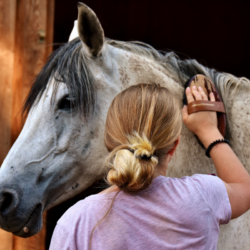External parasites (ticks and fleas), which are often vectors of serious systemic diseases, feed on animal dander and blood, causing lesions and skin irritation.
Symptoms associated with some external parasites (fleas, mites, ticks, etc.) include the following:
- Scratching, itching
- Friction
- The animal bites hard enough to cause open wounds
- Hair loss
- Dull coat
In the presence of these signs, it is indeed advisable to consult your veterinarian. It is also possible that your pet shows no signs of ectoparasitic infestation (such as the presence of a tick) or the only sign may be the presence of a tick clinging to your dog’s skin. In this case, it must be quickly removed in order to avoid the transmission of diseases such as Lyme disease, babesiosis, ehrlichiosis, spring-summer meningoencephalitis, etc.
Fleas (siphonaptera = aphaniptera) :
Fleas are biting, wingless, laterally flattened insects and obligate (adult) parasites of mammals but not very specific to humans. Eggs and immature stages are also found in the environment. Flea infestation is called → pulicosis.
There are many external parasites in dogs (ctenocephalides canis) and cats (ctenocephalides felis). Fleas are the most common external parasites in pets. A flea infestation is particularly unpleasant for the animal and its owner.
Ticks :
Among these external parasites, ticks represent a very specific group of ectoparasites, comprising nearly 869 species. They predate large amounts of blood on animals that are often malnourished, aged, tired, poly parasitized and latent infected. They are also harmful by their toxins. Tick-borne diseases are responsible for a high rate of morbidity and mortality in dogs around the world.
These groups of blood-sucking arthropods are well known for the damage they can inflict on our pets and humans. Many of the infections they transmit are therefore considered to be emerging. This is why it is important to know them better in order to better protect yourself from them.
Ticks are large mites that belong to two families: ixodids (“hard ticks”) and argasids (or “soft ticks”). They can lead to local infection if not properly removed, or can transmit disease. Some of these external parasites are transmissible to humans and the diseases thus contracted are called zoonoses.
Prevention tips to fight against fleas and ticks :
Prevention against ectoparasites is essential. Regular use of tick and flea repellants is still the easiest way to reduce the risk of tick and flea infestation.
It is important to treat external parasites to avoid skin damage, immunopathological responses (allergic dermatitis to flea bites), transmission of other disease-causing organisms (tick-borne diseases), transmission to man (mange), or the impact on the relationship between the owner and his animal.
Here are some tips on how to prevent a potential parasite re-infestation:
- Clear your garden
- Plant repellent plants whose scent repels these little pests. A few flowers are also good tick repellants, such as wormwood, lemongrass geranium and chrysanthemums. On the other hand, forget the genets: ticks are particularly fond of them
- Walk your dog on the trails
- Adopt a hen
Some natural antiparasitic treatments :
Treatment against ectoparasites will depend on the nature and species of the parasite involved. The treatment required to eliminate the parasite varies from parasite to parasite. If your pet has a tick, the best thing to do is take it to the vet who can remove it properly.
Coconut oil :
Coconut oil is repellent against a wide range of blood-sucking arthropods, thanks to certain fatty acids, including biting flies, ticks, bed bugs and mosquitoes, mainly the tiger mosquito.
At Soin et Nature, we also offer natural insect repellents to protect your animals in peace:
Natural insect repellent pipettes :
The natural pipettes ultimately contain natural extracts of Margosa, a tree native to India with natural antiparasitic properties, repellent against biting insects such as fleas, ticks and mosquitoes.
The natural repellent shampoo :
This repellent shampoo contains a special formula to effectively repel the main external parasites, such as fleas and ticks thanks to a combination of 2 active ingredients of plant origin: lavandin essential oil and pyrethrum extract, known for their repellent action on parasites.
Clémentine. M.
Naturopath – Aromatherapist / Herbalist – Phytotherapist
Consultant in clinical phyto-aromatherapy and ethnomedicine







